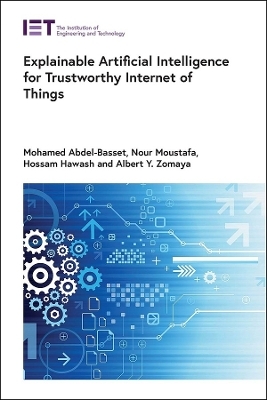
Explainable Artificial Intelligence for Trustworthy Internet of Things
Institution of Engineering and Technology (Verlag)
978-1-83953-802-5 (ISBN)
A major challenge for machine learning solutions is that their efficiency in real-world applications is constrained by the current lack of ability of the machine to explain its decisions and activities to human users. Biases based on race, gender, age or location have been a long-standing risk in training AI models. Furthermore, AI model performance can degrade because production data differs from training data.
Explainable AI (XAI) is the practice of interpreting how and why a machine learning algorithm estimates its predictions. It can also help machine learning practitioners and data scientists understand and interpret a model's behaviour. XAI supports end-users to trust a model's auditability and the productive use of AI. It also mitigates AI compliance, legal, security and reputational risks.
Among these applications, the security of IoT infrastructures is vitally essential for improving trust in broad-scale applications such as smart healthcare, smart manufacturing, smart agriculture and smart transportation.
This comprehensive co-authored book offers a complete study of explainable artificial intelligence (XAI) for securing the Internet of things (IoT). The authors present innovative XAI solutions for securing IoT infrastructures against security attacks and privacy threats and cover advanced research topics including responsible security intelligence.
Providing a systematic and thorough overview of the field, this book will be a valuable resource for ICT researchers, AI and data science engineers, security analysts, undergraduate and graduate students and professionals who wish to gain a fundamental understanding of intelligent security solutions.
Mohamed Abdel-Basset is an associate professor with the Faculty of Computers and Informatics, Zagazig University, Egypt. His research interests include AI, machine and deep learning, computational intelligence, security intelligence, IoT data mining, and applied statistics. He has been program chair for many conferences in the fields of AI optimization and complexity. He is also an editor and a reviewer for international journals and conferences. He holds a PhD from the Faculty of Computers and Informatics, Menoufia University, Egypt. Nour Moustafa is a senior lecturer and leader of intelligent security at the School of Systems & Computing, University of New South Wales (UNSW Canberra), Australia. His areas of research interest include cyber security and artificial intelligence, in particular network security, IoT security, intrusion detection, and machine and deep learning. He is associate editor of IEEE Systems, IEEE Transactions on Industrial Informatics, IEEE IoT Journal, IEEE Access, and Ad Hoc Networks. He is vice-chair, session chair, technical program committee (TPC) member and proceedings chair for leading conferences. He has been awarded the 2020 prestigious ARC DECRA Fellowship and Australian Spitfire Memorial Defence Fellowship Awards. He is a senior IEEE member, ACM distinguished speaker, and Spitfire fellow. He received his PhD degree in computing and cyber security from the UNSW Canberra, Australia. Hossam Hawash is a research assistant and an lecturer with the Department of Computer Science, Zagazig University, Egypt. His research interests include explainable artificial intelligence, machine and deep learning, the Internet of Things (IoT), cyber security, and fuzzy learning. He holds an MSc from the Department of Computer Science, Faculty of Computers and Informatics, Zagazig University, Egypt. Albert Y. Zomaya is Peter Nicol Russell Chair Professor of Computing, Director of the Centre for Distributed and High-Performance Computing, and Australian Research Council professorial fellow in the School of Computer Science, the University of Sydney, Australia. He has published over 30 book titles and is chief editor for the IET Book Series on Big Data. He is a fellow of the Australian Academy of Science, American Association for the Advancement of Science (AAAS), a distinguished member of the Association for Computing Machinery (ACM), fellow of the Institute of Electrical and Electronic Engineers (IEEE, USA), fellow of the Institution of Engineering and Technology and IET chartered engineer (CEng). He received the 2021 IEEE Computer Society's Technical Committee on Cloud Computing Research Innovation Award. He holds a PhD from the Department of Automatic Control and Systems Engineering, Sheffield University, UK.
Chapter 1: Explaining AI for safeguarding and securing Internet of Things (IoT) systems - an introduction
Chapter 2: Securing the Internet of Things: architectures and designs
Chapter 3: Convergence of Internet of Things and computing technologies
Chapter 4: Security vulnerabilities in Internet of Things: attack surfaces, threats, and defense
Chapter 5: Black-box machine learning for IoT security
Chapter 6: Explainable artificial intelligence for safeguarding IoT
Chapter 7: Explainability methods in explainable security intelligence: fine-grained taxonomy
Chapter 8: Intrinsically explainable security intelligence
Chapter 9: Model-agnostic methods for globally interpretable machine learning
Chapter 10: Model-agnostic methods for locally explainable AI to secure IoT system
Chapter 11: Explainability evaluation metrics for explainable security intelligence in the Internet of Things
Chapter 12: Adversarial attacks and defense in explainable security intelligence
Chapter 13: Federated learning meets explainable AI at the edge of things
Chapter 14: Explainable security intelligence for zero-trust IoT
Chapter 15: Explainable security intelligence in IoT applications
| Erscheinungsdatum | 03.09.2024 |
|---|---|
| Reihe/Serie | Computing and Networks |
| Verlagsort | Stevenage |
| Sprache | englisch |
| Maße | 156 x 234 mm |
| Themenwelt | Informatik ► Theorie / Studium ► Künstliche Intelligenz / Robotik |
| Informatik ► Weitere Themen ► Hardware | |
| Naturwissenschaften | |
| ISBN-10 | 1-83953-802-3 / 1839538023 |
| ISBN-13 | 978-1-83953-802-5 / 9781839538025 |
| Zustand | Neuware |
| Haben Sie eine Frage zum Produkt? |
aus dem Bereich


